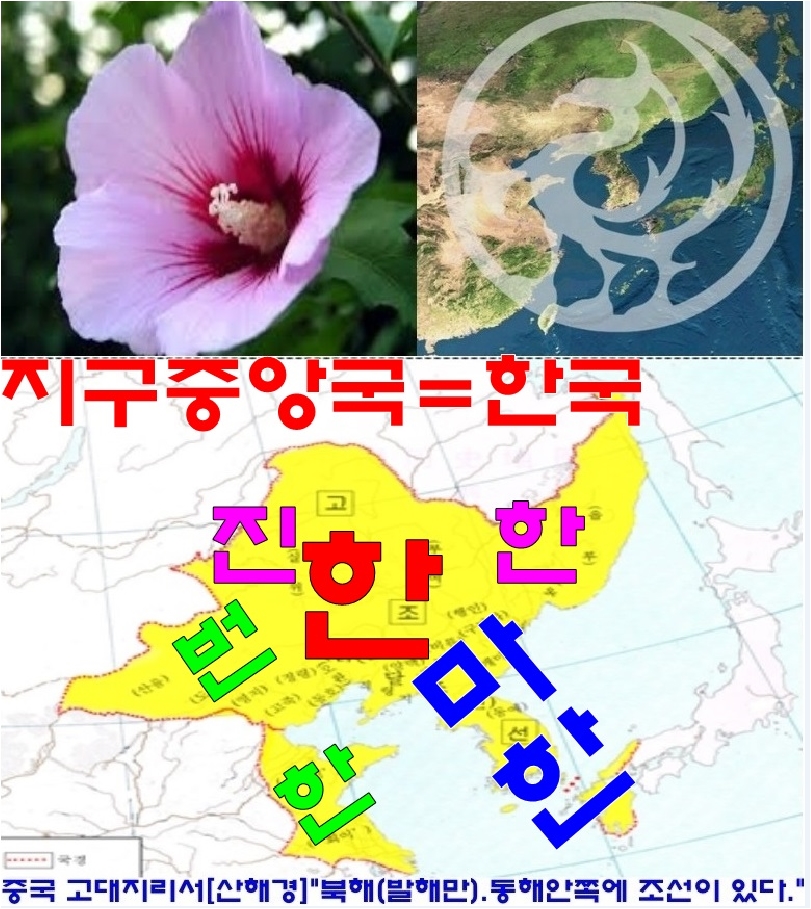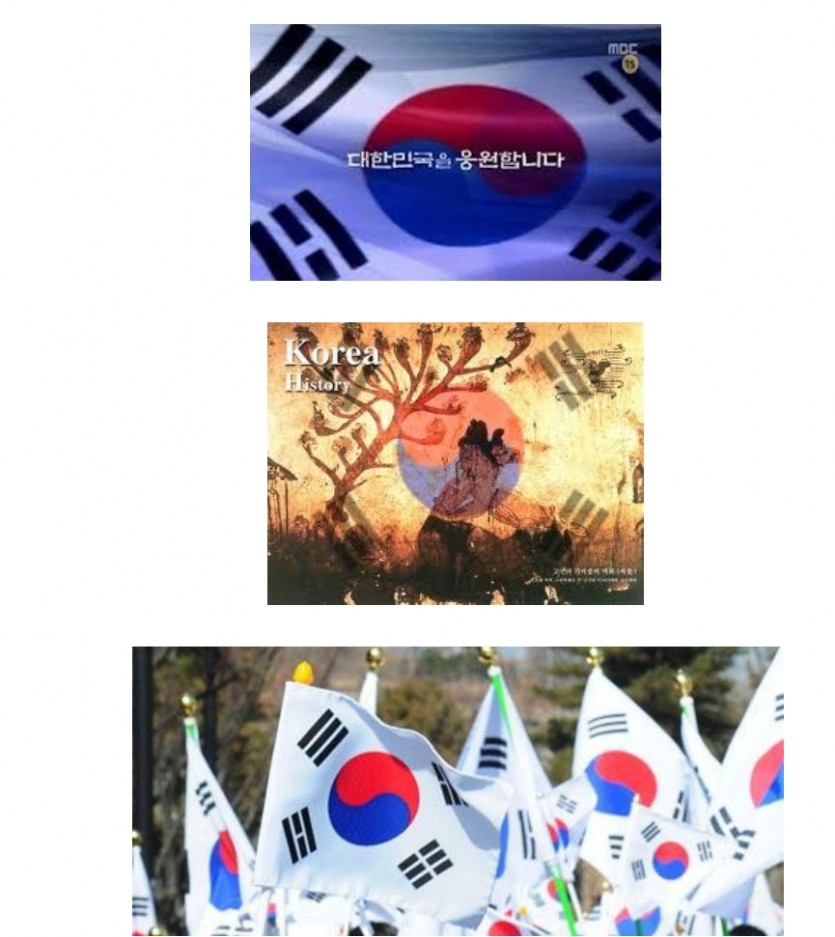우리나라 국호'대한민국'은 '단제한국'을 의미한다!
페이지 정보
본문
'한'이란 국호로 건국된 고조선은 국호를 '대부여'로 바꾸는데 부여라는 용어는 여기에서 나온다. 즉,부여족은 단제한국을 계승한 만주의 한민족이다. 그리고 부여는 '한'을 건국한 단제왕검의 막내 황태자 이름으로 문무를 겸비하여 전투에서 용맹하고 학문이 높고 지혜로왔다는 부여 황태자를 존경한다는 의미로 사용한 국호다.
Gojoseon, which was founded as'Korea', changed the country's name to'loan,' where the term Buyeo comes from. In other words, the Buyeo are the Korean people of Manchuria who succeeded Danje Korea. In addition, Buyeo is the national code used to honor the Prince Buyeo, who was in the name of the youngest prince of the Danje kingsword, who founded Han, and who was valiant in battle, had high academic knowledge, and came with wisdom.
만주에서 한반도지역으로 이주한 부여족은 고구려.백제.신라??를 건국하였다. 고구려.백제.신라는 부여에서 나온 한민족인 것이다. 따라서 지역주의로 나누어 싸울 필요가 전혀 없는 것이다.
The Buyeo tribes, who migrated from Manchuria to the Korean Peninsula, founded Goguryeo, Baekje, and Silla. Goguryeo, Baekje, and Silla are Korean people from Buyeo. Therefore, there is no need to fight by dividing into regionalism.
고대에 단군은 지금의 읍단위 수준의 지역에서 천신을 섬기는 제사를 주관한 제사장으로 중국사료에는 '천군'으로 기록되어 있다. 고대에 한반도와 만주와 열도와 중국 동해안 지역에는 수 많은 단군들이 존재했던 것이다.한국을 건국한 왕검도 앞에 단군이란 칭호를 붙인 이유도 제왕이 되기 전에 외가나라인 단국의 읍단위 지역을 다스리고 제사를 주관한 단군이였기 때문이다.
In ancient times, Dangun was a priest who administered ceremonies for the heavenly gods at the level of the current town level. In ancient times, numerous Danguns existed in the Korean peninsula, Manchuria, the archipelago, and the east coast of China. The reason why the title of Dangun was attached to Wanggumdo, the founder of Korea, governed the towns and ceremonies of Dankuk, the Oegana line, before becoming king. It was because it was Dangun in charge.
"고기에서 말한다. "왕검의 아버지는 단웅檀雄이고 어머니는 웅熊씨의 왕녀이며 신묘(b.c.2370)년 5월2일 인시에 밝달나무(檀木)밑에서 태어났다.신인의 덕이 있어 주변의 모든 사람들이 겁내어 복종했다.14세 되던 갑진(b.c.2357)년 웅씨의 왕은 그가 신성함을 듣고 그로써 비왕裨王으로 삼고 대읍大邑의 다스림을 대행하도록 하였다.무진년(b.c.2333) 제요도당帝堯陶唐때에 단국檀局으로부터 아사달의 檀木단목의 터에 이르르니 온 나라 사람들이 받들어 천제天帝의 아들로 모시게 되었다.이에 구한九桓이 모두 뭉쳐서 하나로 되었고 신과 같은 교화가 멀리 미치게되엇다. 이를 단군 왕검이라 하니 비왕의 자리에 있기를 24년,제위帝位에 있기를 93년이었으며 130세 까지 사셨다."[환단고기/단군세기]
“From Gogi.” Wanggum’s father is Danung檀雄, and his mother is the princess of Mr. Woong, and he was born under a bright moon tree in Insi on May 2nd, bc2370. In Gapjin (bc2357), when he was 14 years old, the king of Ung, when he was 14 years old, heard that he was holy, and made him the king of the king and ruled the Dae-eup Dae-eup on behalf of him. At the time of the dynasty, when they arrived at the site of Asadal's 檀木 Danmok from Dankook, the whole country was supported and enshrined as the son of the Cheonje Tianjin. Accordingly, all of the ancestral ancestors were united to form one, and the god-like edification went far away. This is called Dangun Wanggeom, so he was in the position of the Biking for 24 years, and in the Emperor of the Emperor for 93 years, and he lived until the age of 130."[Hwandangogi/Dangunsegi]
수 많은 단군들의 추대로 제왕에 즉위하게 되니 단제한국의 단제왕검이신 것이다. 따라서 국사교과서에도 이제는 읍단위 수준의 지역을 다스렸던 단군이란 용어보다 수 많은 단군들을 다스렸던 제왕으로서의 단제라는 용어를 기록하고 사용해야 한다. 단군왕검이란 용어는 우리 스스로 국조인 단제왕검을 비하하는 용어이기 때문이다.단제왕검이 건국한 나라가 경천애인이란 정신문명으로 지구인류를 구하는 해를 의미하는 '한'이란 국호를 사용했다.그리고 한은 칸.간.안으로 변음되었다. 따라서 우리나라 국호인 한국이란 해나라를 의미하니 지구중앙국을 의미하는 국호이고 고대부터 동방과 서방의 정신문명을 꽃피운 중심국으로 무궁화나라.군자국으로 불리웠던 것이다.
He became the king of Danje Korea as he was crowned the king with the pursuit of many Danguns. Therefore, it is necessary to record and use the term Danje as the emperor who ruled many Danguns rather than the term Dangun, who now ruled the town-level area in the national history textbook. This is because the term Dangunwanggeom is a term that depreciates our own national ancestor, Danjewanggeom. We used the national designation ``Han'', which means the year that the country in which Danjewanggeom was founded saves the earth's humanity with the spiritual civilization of Kyungcheon Lover. And Han has been transformed into Kan. Therefore, Korea, the national flag of Korea, means the country of the sea, which means the central country of the earth, and since ancient times, it has been called the Mugunghwa country and the military country as the central country that blossomed the spiritual civilizations of the East and the West.
西極之南隅有國焉, 不知境界之所接, 名古莽之國. 陰陽之氣所不交, 故寒暑亡辨; 日月之光所不照, 故晝夜亡辨. 其民不食不衣而多眠. 五旬一覺, 以夢中所爲者實, 覺之所見者妄. 四海之齊謂中央之國, 跨河南北, 越岱東西, 萬有余里. 其陰陽之審度, 故一寒一暑; 昏明之分察, 故一晝一夜. 其民有智有愚. 萬物滋殖, 才藝多方. 有君臣相臨, 禮法相持. 其所云爲, 不可稱計. 一覺一寐, 以爲覺之所爲者實, 夢之所見者妄. 東極之北隅有國, 曰阜落之國. 其土氣常?, 日月餘光之照其土, 不生嘉苗. 其民食草根木實, 不知火食. 性剛悍, 彊弱相藉, 貴勝而不尙義; 多馳步, 少休息, 常覺而不眠. [열자 주목왕 4]"또 사방의 거리가 똑같은 나라를 중앙국이라 한다. 큰 강이 남쪽과 북쪽에 걸쳐 있고 높은 산이 동쪽과 서쪽에 있어서 지방이 모두 만여 리에 이른다. 음양의 도수가 분명하므로 춥기도 하고 덥기도 하다. 암흑과 광명의 구별이 분명하므로 낮이 되기도 하고 밤이 되기도 한다. 그 나라 백성들은 지혜도 있고 어리석기도 하다. 온갖 물건이 번성한다. 재능도 여러 방면에 있다. 임금과 신하가 서로 만나기도 한다. 예의도 서로 차리고 법률도 서로 지킨다. 그들이 말도 하고 일도 하는 것이 너무 많아서 다 이루 헤아릴 수가 없다. 이 나라 백성들은 낮에는 깨어있고 밤에는 잠자고 있다. "
"A country with the same distance in all directions is called Central Bureau. A large river spans the south and north, and high mountains are in the east and west, so the provinces are all ten thousand ri. The distinction between darkness and light is clear, so it can be day or night, the people of that country are both wise and foolish, all kinds of things are prosperous, and talents are in many ways. They meet each other. They are polite and obey each other. They talk and work so much that it is impossible to count. The people of this country are awake during the day and sleep at night."[Yumja King of Yew 4]
중국사료에는 우리나라를 중심국으로 기록하고 있고,한민족이 이주하여 거주한 아메리카를 부락국으로 기록하고 있고, 한민족이 이주하여 거주한 서방을 고망국으로 기록하고 있는 배경이다. 그리고 중심국인 우리나라 영토를 시베리아에서 동남아에 이르는 1만리였고 말이 서로 통했다고 기록하고 있다.
In the Chinese feed, Korea is recorded as the central country, the Americas where Koreans migrated and resided are recorded as villages, and the West, where Koreans migrated and resided, is recorded as the ruling country. And it is recorded that the territory of Korea, the central country, was 10,000 ri, from Siberia to Southeast Asia, and horses communicated with each other.

조선이란 국명이 처음 등장하는 건 기원전 3세기 이후에 들어서서입니다.<상서>라든지 <삼국지 위지>라든지 <산해경>이라든지 하는 책에 처음 조선이 등장하는 거죠. 기자가 동쪽으로 갔다는 기록도 이때 만들어집니다. 하지만 한후는 이미 기원전 9세기 무렵의 기록에 나옵니다. 그러면 한과 조선 중 어느 게 먼저인지 자연히 알 수 있다.
Joseon's name first appeared after the 3rd century B.C. It was the first time Joseon appeared in books such as <Sangseo>, <Weeji of the Three Kingdoms>, and <Sanhaekyung>. A record is also made at this time that the reporter went east. However, Hanfu is already recorded in the 9th century BC. Then, you can naturally know which is the first between Korea and Joseon.
우리의 조상이 '오성취루'를 기록한 기원전 1733년보다 약 천 년 후인 기원전 827년에서 782년 사이에 한후는 주나라 선왕을 방문했고 그로부터 천 년 후 왕부는 자신의 저서 <잠부론>에 이렇게 썼다. 한을 언급하고 있는 또 한 권의 책은 후한의 학자인 왕부가 쓴 <잠부론(潛夫論)>이다.왕부는 이 <잠부론> '씨성' 편에서 한씨의 유래를 따지면서 바로 <시경>에 나왔던 한후를 언급하고 있다.
Between 827 and 782 B.C.E., about a thousand years after our ancestors wrote'Oseongchwiru', between 827 and 782 B.C.E., Han Hu visited King Seon of the Zhou Dynasty, and a thousand years later, the king wrote in his book Zamburon: . Another book that mentions Han is ``Zamburon'', written by the Wang, a scholar of the generous Han. He is referring to Hanhoo from >.
"시경 속 한후는 기자조선의 동쪽에 있는 나라의 임금이다." 기자조선이란 요서지역에 위치한 단제한국의 서토다. 따라서 주나라를 방문한 한후는 단제한국의 제후로 요서지역을 다스린 번한을 의미하는 것이다. 번한은 단제한국의 제왕의 명을 받는 부단제인 것이다.
<시경> 한혁(韓奕) 편에는 이 한후라는 인물이 나온다.
"한후(韓侯)는 맥족을 복속시키고 그 땅의 제후가 되었다.한후가 수도에 들자 선왕(宣王)은 경계를 논하였으며 조카딸을 시켜 밤시중을 들게 하였다."
기원전 800년 시대를 기록한 중국사료인 '시경'에 국경문제를 다루기 위해서 주나라를 방문한 한국의 제후인 한혁이 기록되어 있는데 이 때 한혁을 한후라고 기록하고 있는 내용에서 당시 우리나라 국호가 '한(韓)'임을 분명히 알 수 있다.
"Hanhu in Sikyung is the king of the country to the east of Giza Chosun." Reporter Chosun is the western land of Danje Korea located in the Yoseo area. Therefore, Hanhu, who visited the Zhou dynasty, means Bunhan who ruled the Liao-seo area as the reign of Danje Korea. Bunhan is a Buddhist priest who is commanded by the King of Korea.
In the part of <Sikyung> Hanhyuk (韓奕), there is a character named Lee Hanhoo.
"Han-hu subjugated the Mac people and became the ruler of the land. When Han-hu entered the capital, King Seon discussed the warning and ordered his niece to attend the night."
Han-hyuk, the reign of Korea, who visited the Zhou to deal with border issues, is recorded in the Chinese feed recorded in 800 BC. 'It can be clearly seen.

'한'은 너무나 영토가 크고 인구가 많았기 때문에 '큰 해(태양)'을 의미하는 '대한'이라고 불렀고,지구중앙국 제왕만이 지낼 수 있는 제천의식을 지낸 고종황제가 단제한국의 회복하겠다는 의지로 국호를 '대한'으로 정한 것이고, 지금의 '대한민국'의 국호가 된 것이다.따라서 대한민국이란 "단제한국 백성들의 나라'라는 의미를 가진 국호인 것이고 대한민국의 국시는 단제한국의 공존공영 이념인 홍익인간정신의 실현과 단제한국의 모든 영토를 회복하는데 있는 것이다!
'Han' was called'Daehan', which means'the great sun' because the territory was so large and the population was so large, and Emperor Gojong, who had a ritual of Jecheon that only the king of the global central country could live, said that Danje Korea would recover. The national designation was chosen as ``Korea'' by will, and it became the national designation of ``Korea.'' Therefore, Korea is the national designation meaning ``the country of the Danje Korean people,'' and the national poem of the Republic of Korea is the ideology of coexistence and co-prosperity of Danje Korea. It is in the realization of the Hongik human spirit and restoring all territories of Danje Korea!
그리고 한민족이 섬기고 제사지낸 주인된 신을 의미하는 '주신(숙신)'에서 유래한 '조선'이란 이름은 본래 국호가 아니라, 천신을 섬기는 한민족을 사는 모든 지역을 의미하는 관경을 의미하는데, 한민족의 중심지역인 한반도와 만주를 중심으로 한민족이 이주하여 제천문명을 남긴 지나.중앙아.아메리카.중동.유럽 등 전 지구촌을 의미하는 용어가 조선이다.
In addition, the name'Chosun' derived from'jusin (suksin)', which means the master god served and sacrificed by the Korean people, is not a national name, but refers to a landscape that refers to all areas of the Korean people who worship the heavenly gods. Chosun is the term that refers to the entire global village, including Gina, Central Asia, America, Middle East, and Europe, where the Korean people migrated from the Korean peninsula and Manchuria, which left behind the first cheonsei.
그런데, 동아시아 최고 지리서인 [산해경]기록에 "동해 안쪽 북해 모퉁이에 조선이란 나라가 있는데 그들은 하늘의 사람들로 물가에 살며 서로를 아낀다."라고 기록하고 있는 것이다. 즉, 전 지구촌으로 이주하여 제천문명을 건설한 한민족의 모국이 바로 한반도와 만주와 중국 동해안 지역에 존재하였던 단제한국임을 중국사료[산해경]은 증명하고 있는 것이다.
By the way, in the record of [Sanhaekyung], the best geography book in East Asia, "There is a country called Joseon at the corner of the North Sea in the inner East Sea, and they live by the waters as people of the sky and care for each other." In other words, China Feed [Sanhaekyung] proves that the motherland of the Korean people who moved to the entire global village and built the Jecheon civilization was the Danje Korea that existed in the Korean Peninsula, Manchuria, and the east coast of China./윤복현
댓글목록
등록된 댓글이 없습니다.

